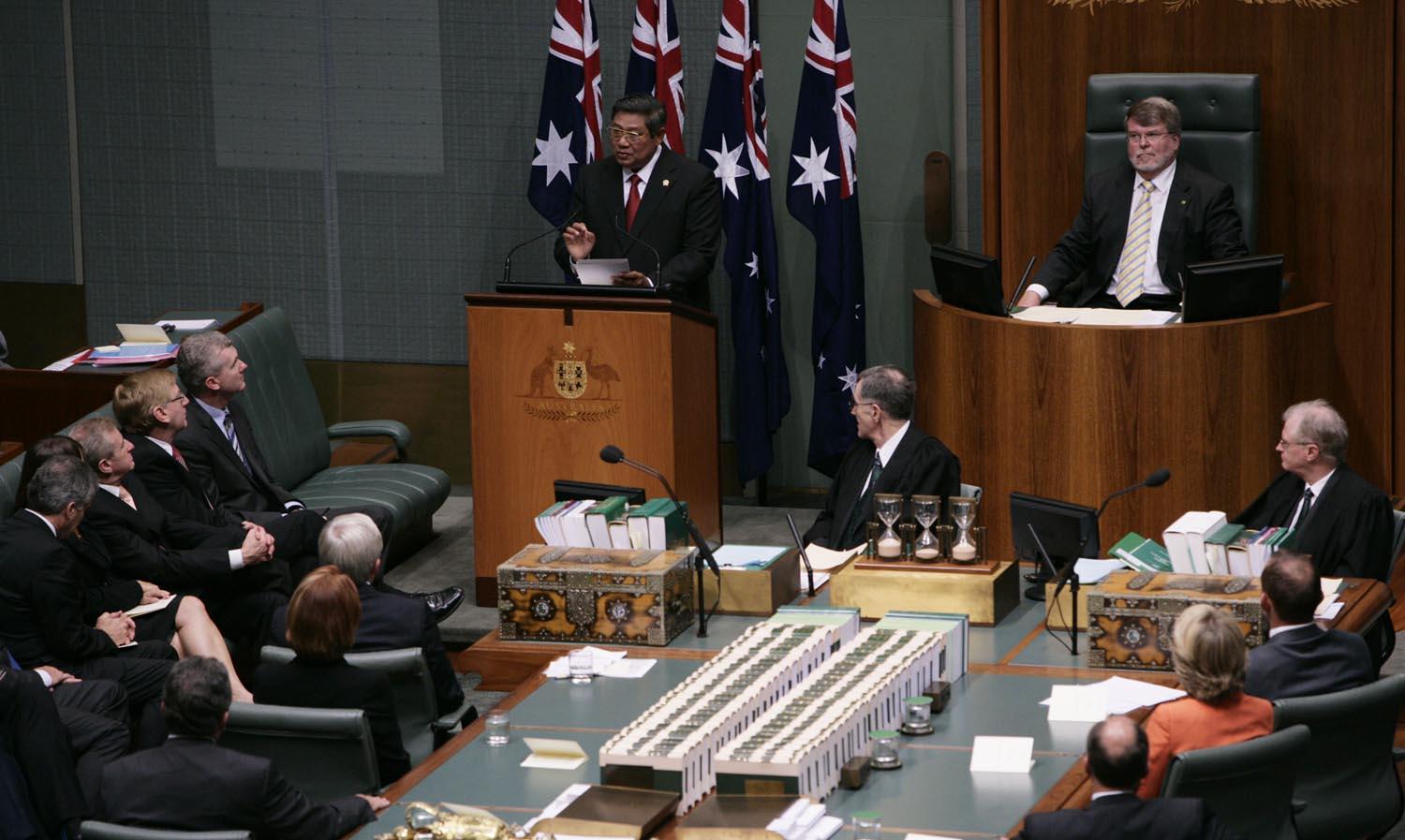 For nearly ten years as Indonesia’s leader, Susilo Bambang Yudhoyono has presided over the most stable and productive era in the tumultuous diplomatic relationship between Jakarta and Canberra.
For nearly ten years as Indonesia’s leader, Susilo Bambang Yudhoyono has presided over the most stable and productive era in the tumultuous diplomatic relationship between Jakarta and Canberra.
Australia’s extraordinary $1 billion act of generosity in the wake of the 2004 tsunami helped recast the pattern of official engagement between these two utterly different neighbours. Since then, government-to-government links have deepened and widened and now include a web of agreements negotiated under the provisions of the 2006 Lombok Treaty agreed by President Yudhoyono and John Howard.
By March 2010 an historic high-point in bilateral relations had been reached, with Yudhoyono declaring to the Australian parliament that Indonesia and Australia had evolved a special relationship’. The two countries weren’t just neighbours and friends but ‘strategic partners’.
The result of that partnership has been a steady upswing in security cooperation between Canberra and Jakarta, ranging from counter-terrorism and military training to Australian Federal Police disruption of people-smuggling syndicates, and much closer intelligence sharing between government agencies.
As a senior military officer in the mid-1990s, then as a leading cabinet minister and finally President, Yudhoyono personally assisted the deepening of broader official ties. He knows Australia well and one of his sons was educated in Perth. Yudhoyono also understands, arguably better than any of his predecessors, the profound cultural divide that will forever separate Indonesia and Australia. This week’s unprecedented leak of top secret documents detailing Australia’s signals intelligence efforts in targeting of the mobile phones of Yudhoyono, his wife and his key leadership group in 2009 came as a slap in the face to the Indonesian leader.
Late yesterday came the predictable response from Jakarta in answer to Prime Minister Abbott’s reluctance to clarify the 2009 efforts to listen to the Indonesia leader’s mobile phone calls. Yudhoyono suspended defence, intelligence and security cooperation, including Indonesian military activities aimed at curbing people-smuggling pending a full explanation from Canberra.
This is the most serious rupture in bilateral relations since the East Timor crisis in 1999, which saw bilateral security cooperation terminated for several years and the abrogation by Jakarta of the security treaty agreed in 1995 by former president Suharto and Paul Keating.
Yudhoyono now seeks a fresh protocol on intelligence cooperation with Canberra. He has put his concerns in writing to Tony Abbott. Yudhoyono is well aware of the broad scope and long-standing nature of Australia’s signals intelligence gathering against Indonesia. Sigint collection focused on Jakarta has been a priority task for the Australian Signals Directorate and its predecessors for more than 50 years.
Beginning with Konfrontasi in the early 1960s and continuing through Indonesia’s invasion of East Timor in 1975 and successive crises in bilateral relations in the mid-1980s and over East Timor again in 1999, Australian intelligence agencies have regularly conducted signals intelligence operations across the archipelago.
But it’s the scale of targeted intrusion into personal communications within the Presidential palace by Australia, as revealed by Edward Snowden, that caused Yudhoyono to talk of a ‘violation of the strategic partnership with Indonesia’.
Just six weeks ago that strategic partnership seemed in reasonable shape in the wake of Abbott’s first prime ministerial visit to Jakarta. At a dinner at the Istana in Jakarta on September 30 Abbott raised recent irritants in bilateral ties, including the Gillard government’s peremptory cancellation of the live cattle trade. Abbott told Yudhoyono:
There have been times when all sides of Australian politics should have said less and done more. I am confident that the relationship will once more be one of no surprises, based on mutual trust, dependability and absolute respect for each other’s sovereignty under the Lombok Treaty.
His speech that night also contained a sting in the tail, raising the key issue that continues to overshadow the whole tenor of his approach to Jakarta. ‘Our relationship has so much promise and everything will be easier once the people-smuggling complication is gone’, the Prime Minister pointedly concluded. Any decision by Indonesia to curtail cooperation on people-smuggling operations could further destabilise bilateral relations given Tony Abbott’s repeated pledge to stop the boats.
With a presidential election due next year, nationalist sentiment is on the rise in Indonesia and Australia has always been an easy low-cost target for disgruntled politicians in Jakarta. ‘The most persistent problem in our relations’, Yudhoyono observed in 2010, ‘is the persistence of age-old stereotypes-misleading simplistic caricatures that put the other side in a bad light’. Nothing has changed in that regard.
We don’t know to what extent the Prime Minister knew of Australia’s electronic eavesdropping on Indonesia after he took office. But the Snowden revelation last month that the US had listened into Angela Merkel’s mobile phone should have prompted the PM’s senior advisers to ask some searching questions on the scope of sigint operations conducted by the Australian Signals Directorate in our neighbourhood, and the likely diplomatic fallout from fresh leaks. Abbott will also have to ponder the questionable intelligence gains flowing from the kind of operation carried out by DSD in Jakarta in 2009.
Unlike Barack Obama in the Merkel case, the Prime Minister is disinclined to apologise to Yudhoyono over the Snowden leaks. But this latest rift won’t be easily settled without a lengthy personal explanation to the Indonesian leader including a clear assurance from Australia that the type of intelligence operations outlined in 2009 won’t happen again.
Patrick Walters will write regularly for The Strategist. Image courtesy of website of the President of the Republic of Indonesia.